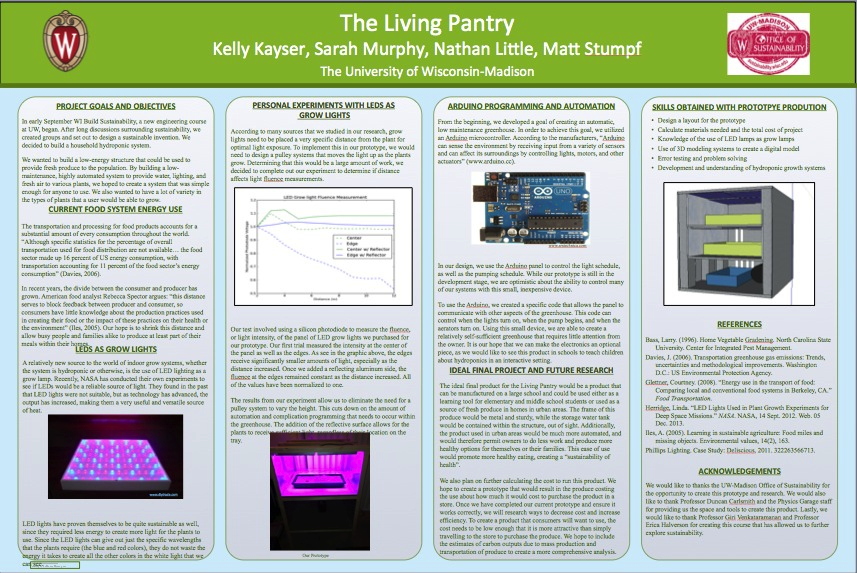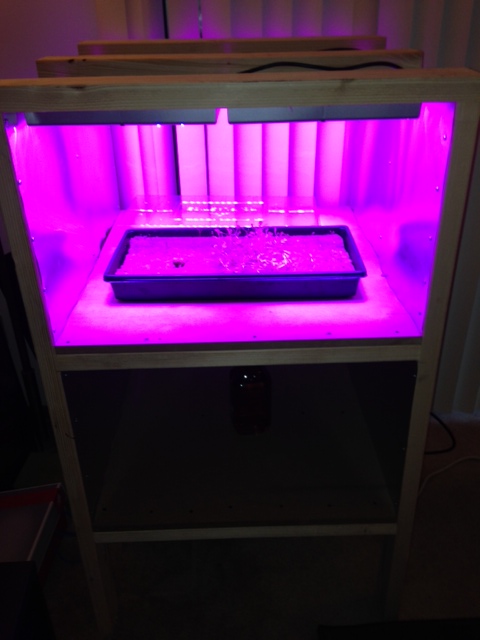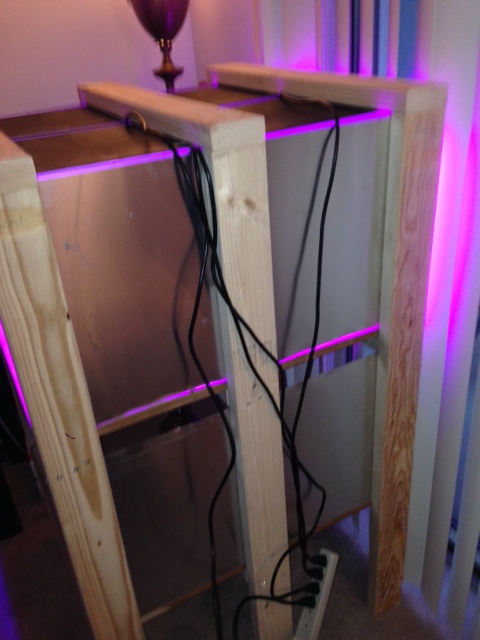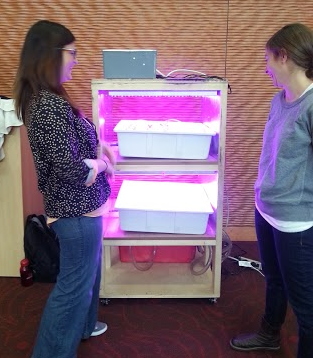 (Energy Hub poster, Dec. '13)
(Energy Hub poster, Dec. '13)



(Prototype Nov 2013 , Front and side views, and Energy Hub operating prototype)
Living Pantry
Innovators: Kelly Kayser, Sarah Murphy, Nathan Little, Matthew Stumpf
Our project aims to make fresh and healthy produce more accessible to the masses and reduce the distance from garden to table. Our team is working to develop a tool that gives the user the convenience of in-home technology with the addition of sustainability. With an easily available source of fresh produce right in the home, this greenhouse helps to reduce the amount of food being transported and packaged around the world, which means less oil and gasoline is being used in the vehicles used to transport the food and less packaged waste. This indoor greenhouse will make it easy and efficient for the average homeowner to grow produce in one’s own kitchen throughout the year. Implemented in this greenhouse is a hydroponic system, which uses nutrient rich water to grow the plants. This means homeowners can say goodbye to dirt, because the Living Pantry is all water and produce.
Goals
- To build a simple and energy efficient indoor greenhouse that is easy to use and effective at producing large yields of produce in a small space
- To make the greenhouse affordable and easy to set up
- To develop a control system that allows the user to set a timer to turn on and off the light, program automatic watering, and control the heat that the plants are being kept in
- To create a simple and sleek design that is easily incorporated to the common home
- To develop a series of plant pallets, that will float above the nutrient rich water. Only the roots should be below water, while the remaining plant grows above
- The lighting will be LED panels over the plants
- The product should be self-sufficient with little maintenance required
project timeline & milestones (report and presentation, etc)
September 29 - October 5 · Decided upon greenhouse location – inside or outside· Decide upon greenhouse shape· Decide upon materials used to build house· Draw layout of greenhouse 2-Dimentionally. MILESTONE : 2-D layouts
October 6 - October 12 · Use 2-D greenhouse layout to create a 3 dimensional rendering· Calculate out exact amount of materials being used.· Calculate material cost. MILESTONES: Cost sheet and 3-D rendering
October 13 - October 26 · Purchase materials needed for greenhouse.· Build frame· Install water piping.· Learn about and begin control system and wiring. MILESTONE: Framing completed
October 27 - November 9 · Install paneling and heat lamps.· Continue work on control system.
November 10 – December 7 · Finish and install control system.· Finish prototype. Begin error testing and problem solving. MILESTONE: Finished Prototype
December 6 · Present the Living Pantry at "The Secret Life of Energy: Waste". MILESTONE: Practice Presentation at Energy Hub Event
December 8 - December 14 · Present finished project. MILESTONE: Presentation
summary of sources
- urbanorganicgardner.com (How to select best grow light)
- wikipedia.org (grow light)
- greenhousecatalog.com (grow lights)
- bonsaihunk.us/info/LEDvsFluoresc.html (price difference between LEDs and Fluorescents)
- dormgrow.com/grow-tips-for-led-grow-lights (amount of wattage needed for plant to light distances)
resources needed
- Appropriate materials for structure and support
- Aeration for the roots
- How deep will the roots go into the water and should they be contained
- Floatation for the plants